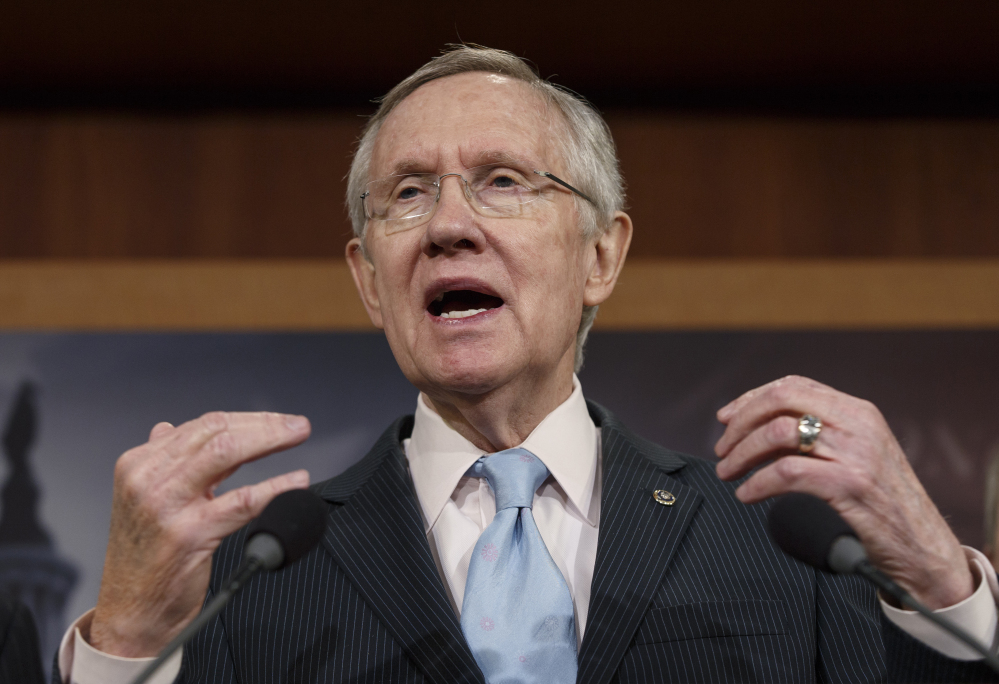WASHINGTON – The White House says it will continue to press Congress for “fast-track” authority to speed approval of trade deals even as election-year politics makes the task harder.
The Obama administration is engaged in two difficult trade negotiations, one with Japan and 10 other Pacific nations, and the other a proposed trans-Atlantic deal with European Union nations. The trans-Pacific talks are closer to completion.
President Bill Clinton used such powers to push through the North American Free Trade Agreement among the U.S., Canada and Mexico in 1993. President George W. Bush used fast-track authority to push through Congress the Central American Free Trade Agreement in 2005.
The fast track process, more formally known as “trade promotion authority,” empowers presidents to negotiate trade deals and then present them to Congress for up-or-down votes, with no amendments allowed.
Such trade deals have always been more popular with Republicans than Democrats.
That’s largely because business interests aligned with Republicans have always formed the core support for efforts to expand trade, while labor unions traditionally supportive of Democrats claim trade deals like NAFTA have cost U.S. jobs, helping to send them overseas.
Politically, what it means is that House Speaker John Boehner, R-Ohio, is on President Barack Obama’s side this time. Fast-track critics Senate Majority Leader Harry Reid, D-Nev., and former House Speaker Rep. Nancy Pelosi, D-Calif., are working against him.
The day after Obama asked for fast-track authority in his State of the Union address last month, Reid asserted: “I’m against fast track. … Everyone would be well-advised just to not push this right now.”
White House spokesman Jay Carney said Tuesday that despite such objections from Democratic leaders, “we’re going to continue to press for this priority.”
Carney was asked whether recent generally pessimistic-sounding comments on prospects for fast track by Vice President Joe Biden to a Democratic conference could be taken as recognition by the White House that the trade legislation wasn’t going anywhere anytime soon.
Carney said no but added that the administration is “mindful … that there are differing views in both parties, not just the Democratic Party” on the subject.
But opposition to the trade deals is more pronounced on the Democratic side.
Late last year, 151 House Democrats, roughly three-quarters of the chamber’s Democratic membership, signed a letter to Obama signaling their opposition to granting him fast-track trade authority.
In the past, Obama has not been an ardent supporter of the fast-track process. Even without fast track, Obama was able to win congressional passage of free-trade pacts with Colombia, Panama and South Korea the old-fashioned way in 2011. And he has yet to make a high-profile major push for renewal of the powers since his State of the Union comments.
If ratified, the proposals – the Trans-Atlantic and Trans-Pacific Trade and Investment Partnerships – would create the largest free-trade zone in the world, covering roughly half of all global trade.
But the free-trade talks are generating strong emotions at home and abroad.
Many Democrats up for re-election in November are fearful of drawing primary-election opposition over the issue. Concerned about lost jobs that are important to labor unions, they’re abandoning Obama on this issue.
Meanwhile, some European allies are pushing back, still peeved over recent disclosures of National Security Agency surveillance of them.
Obama had hoped an agreement could be reached on the trans-Pacific talks before he visited Japan and other Asian nations in April. But the trans-Pacific talks have been complicated by disputes over environmental issues and resistance in some Asian countries to a wholesale lowering of trade barriers.
Boehner, R-Ohio, taunts Obama by asserting that “trade promotion authority is ready to go. So why isn’t it done?”
“It isn’t done because the president hasn’t lifted a finger to get Democrats in Congress to support it,” Boehner said, answering his own question. “And with jobs on the line, the president needs to pick up his phone and call his own party, so that we can get this done.”
A fast-track bill may be “ready to go” in the GOP-controlled House but certainly isn’t in the Democratic-led Senate.
Little by little, the politics of approaching midterm elections are intruding.
“Neither political party at this point has any appetite for taking on an issue that would divide that party’s caucus in Congress,” said William Galston, Clinton’s domestic-policy adviser when NAFTA was passed. “That being said, I suspect that very little is going to happen between now and November” on the trade front.
“Bill Clinton had to go against the majority of his own party, especially in the House,” noted Galston, now a senior fellow at the Brookings Institution think tank.
U.S. Trade Representative Michael Froman says that, regardless of the political season, the administration will continue to push for fast-track authority. Without it, “You can’t negotiate (trade deals) with our partners and you can’t implement (them) here in the United States,” Froman said.
But Alan Tonelson, an economist with the United States Business and Industry Council, argues that “American workers on the whole have been leading victims” of such free-trade agreements, beginning with NAFTA.
“Rather than rushing to conclude and endorse new trade initiatives, Congress and the administration should first figure out how to ensure that they serve as engines of domestic growth and job creation, rather than of offshoring and lower living standards,” he said.
Send questions/comments to the editors.



Comments are no longer available on this story